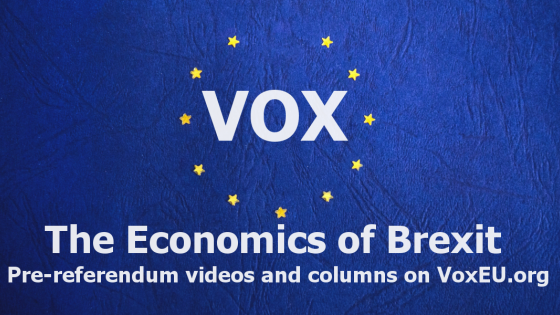The UK’s exit from the EU was finally completed on 1 January 2021, nearly five years after the Brexit referendum of 2016 (Baldwin 2016, Wyplosz 2016).
The IGM Forum at Chicago Booth, which, for nearly a decade, has been regularly polling some of the world’s top economic experts in the US and Europe for their views on topical issues of public policy, invited its US and European panels to express their views on the likely long-term effects on both the UK economy and the aggregate economy of the remaining 27 EU members.
Following the standard format of the IGM polls, the experts were asked whether they agreed or disagreed with the following statements, and, if so, how strongly and with what degree of confidence:
(a) The UK economy is likely to be at least several percentage points smaller in 2030 than it would have been if the country had remained in the European Union.
(b) The aggregate economy of the 27 countries still in the EU is likely to be at least several percentage points smaller in 2030 than if the UK had not left.
Of the 48 European experts, 44 participated in this survey; of the 43 US experts, 39 participated – for a total of 83 expert reactions.
The UK economy
On the first statement about the potential impact on the UK by the end of the decade relative to the counterfactual of the country having remained in the EU, a strong majority (86% of the panellists) agrees that the UK economy is likely to be at least several percentage points smaller in 2030 than it otherwise would have been.
Weighted by each expert’s confidence in their response, 49% of the European panel strongly agree, 41% agree, 8% are uncertain, and 3% disagree (the totals don’t always sum to 100 because of rounding). Among the US panel (again weighted by each expert’s confidence in their response), 12% strongly agree, 67% agree, 21% are uncertain, and 0% disagree.
Overall, across both panels, 35% strongly agree, 51% agree, 13% are uncertain, and 2% disagree.
More nuances in the experts’ views come through in the short comments that they are able to include when they participate in the survey. Among those who strongly agree, Thierry Mayer (Sciences-Po) notes: “This is one of the topics where quantified evidence has accumulated over the recent years, pointing to large welfare losses”. Richard Portes (London Business School) says: “There are many studies, both official sector (e.g. the Office for Budget Responsibility) and academic (e.g. the Centre for Economic Performance at the London School of Economics). The consensus range is 4–6%.”
Several panellists refer to the channels by which a negative impact is likely to occur. John Van Reenen (LSE) states: “All serious Brexit analysis shows a significant hit to the UK because of higher trade costs with its nearest neighbour.” Peter Neary (University of Oxford) explains: “Leaving the Single Market and customs unions imposes non-tariff trade barriers that will impact negatively on trade volumes.”
Daniel Sturm (LSE) comments: “There are many channels, but more border frictions, less trade and therefore less growth is the most direct one.” Christopher Pissarides (LSE) notes: “Because of trade barriers and much less collaboration in research and trade agreements with third parties.” Christian Leuz (Chicago Booth) adds: “For the UK, there are multiple channels at play: trade, migration and human capital, and foreign direct investment.”
Some panellists point to effects that have already happened. Judith Chevalier (Yale University) mentions: “Effects on investment and productivity have already been measurable.” John Vickers (University of Oxford) concurs that “substantial negative effects on investment and productivity” have already been seen since the referendum. And Nicholas Bloom (Stanford University) says: “Brexit has reduced UK trade in services and migration. Both were driving growth and now both have been reduced.”
A number of panellists provide links to analysis of Brexit effects, including official reports (Bank of England 2020, HM Government 2018, Office for Budget Responsibility 2021) as well as independent research by some of the panellists themselves on the impact of Brexit on UK firms (Bloom et al. 2019), on trade elasticities and geographical distance in the context of Brexit (Carrere et al. 2020), on the costs of Brexit compared with Covid-19 (Van Reenen 2020), and the consequences for UK trade and living standards (Dhingra et al. 2016).
Among the panellists who say they are uncertain, several mention the role of future UK policy choices in determining the overall growth outcome. For example, Jose Scheinkman (Columbia University) observes: “While the impact is most likely negative, the magnitude is still very uncertain and will depend on UK's future policy choices.”
Jordi Galí (Universitat Pompeu Fabra and Barcelona GSE) adds: “It will depend on the quality (in the sense of growth-oriented) of the policies it undertakes from now.” Aaron Edlin (University of California, Berkeley) says: “We don’t know yet what trade agreements will replace it.” And Jan Pieter Krahnen (Goethe University Frankfurt) explains: “It all depends on the extent to which the UK will pursue a beggar-thy-neighbour policy, basically free-riding or arbitraging on the EU.”
Daron Acemoglu (MIT), who agrees with the statement, is pessimistic about the likely policy choices: “That's my median expectation. Not because of the direct effect of less trade but because of worse policies that will result from Brexit politics.” But Robert Hall (Stanford University), who says he is uncertain, is one of several panellists doubtful about how far forward we can look: “This is an incredibly complicated issue with forces going in both directions. Pretence to expertise would be misplaced.”
The EU economy
On the second statement about the potential impact on the aggregate EU27 economy by the end of the decade relative to the counterfactual of the UK having remained, views are more divided. Nearly a quarter of respondents agree that the EU27 economy will be at least several percentage points smaller in 2030 than it otherwise would have been. But more than a third say they are uncertain, while 41% disagree that the impact will be that strongly negative.
Again, there are notable differences between the two panels’ views. Of the European panel (again weighted by each expert’s confidence in their response), 12% strongly agree, 14% agree, 28% are uncertain, 38% disagree and 9% strongly disagree. Members of the US panel are more uncertain, fewer disagree and none say that they agree or disagree strongly: 20% agree, 48% are uncertain, and 31% disagree.
Overall, across both panels, 7% strongly agree, 16% agree, 36% are uncertain, 35% disagree, and 6% strongly disagree.
Among those who agree or strongly agree, there are concerns about the impact of the loss of the UK’s voice in EU policy-making. Nicholas Bloom argues: “The UK was a free market voice in the EU before Brexit. Without the UK, the EU will be more protectionist.” Lubos Pastor (Chicago Booth) shares this view: “After Brexit, the EU will miss Britain's strong voice favouring market solutions and economic efficiency.” And Jan Pieter Krahnen says: “The UK's EU membership produced positive externalities, concerning goods and services, but also with regard to the broader policy decisions taken.”
Of the panellists who say they are uncertain, Kjetil Storesletten (University of Oslo) comments: “The EU will suffer from Brexit although less than the UK. Reason: EU is much larger than the UK.” Daniel Sturm says: “Less trade with the UK is not enough of a negative shock for the EU and may be compensated by firms relocating from the UK to the EU.” Richard Thaler (Chicago Booth) asks: “How much of the London financial sector moves to the continent?” And Pete Klenow mentions research on the global impact of Brexit uncertainty (Hassan et al. 2020).
Among those who disagree, several mention the different sizes of the UK and EU economies. Franklin Allen (Imperial College London) notes: “The UK was not a very large part of the total EU so it is difficult to believe there will be that large an effect.” Patrick Honohan (Trinity College Dublin) agrees: “Some areas will be affected, but the aggregate impact is likely to be less than ‘several percentage points’.” And Maurice Obstfeld (University of California, Berkeley) says: “The EU27 will suffer far less than the UK… a much smaller proportion of their foreign trade is at stake.”
Others who disagree note nevertheless that some parts of the EU might be hit harder than others. Beata Javorcik (University of Oxford) says: “The impact on EU countries (other than Ireland) will be much smaller than the impact on the UK.” John Van Reenen adds: “The EU needs the UK less than the UK needs the EU. There is bigger hit to some countries (e.g. Ireland) but not so much in aggregate” (Dhingra et al 2017). And Peter Neary concludes, citing another panellist (Mayer et al 2018): “Some countries will be negatively affected (e.g. Ireland, the Netherlands, Denmark) but larger and more Eastern ones are unlikely to suffer much.”
References
Baldwin, R (2016), "The economics of Brexit: Pre-referendum videos and columns", VoxEU.org, 12 July.
Bank of England (2020), Monetary Policy Report – November 2020.
Bloom, N, P Bunn, S Chen, P Mizen, P Smietanka and G Thwaites (2019), “The Impact of Brexit on UK Firms”, NBER Working Paper No. 26218.
Carrère, C, M Mrázová and J P Neary (2020), “Gravity Without Apology: the Science of Elasticities, Distance and Trade”, Economic Journal 130(628): 880-910.
Dhingra, S, H Huang, G Ottaviano, J P Pessoa, T Sampson and J Van Reenen (2017), “The costs and benefits of leaving the EU: trade effects”, Economic Policy 32(92): 651-705.
Dhingra, S, H Huang, G Ottaviano, T Sampson and J Van Reenen (2016), “The consequences of Brexit for UK trade and living standards" , VoxEU.org, 4 April.
Hassan, T A, S Hollander, L van Lent and A Tahoun (2020), “The Global Impact of Brexit Uncertainty", NBER Working Paper No. 26609.
HM Government (2018), "EU Exit: Long-term economic analysis".
Mayer, T, V Vicard and S Zignago (2018) "Revisiting the cost of non-Europe’, VoxEU.org, 2 August.
Office for Budget Responsibility (2021), ‘Brexit analysis"
Van Reenen, J (2020), "The cost of Brexit is likely to be more than double that of COVID – it must be delayed", LSE Business Review.
Wyplosz, C (2016), What to do with the UK? EU perspectives on Brexit, CEPR Press.




